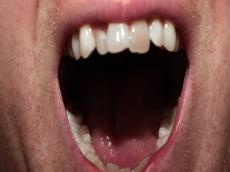|
|
TODAY.AZ / Weird / Interesting
Footballers have 'worryingly poor' teeth
03 November 2015 [14:39] - TODAY.AZ

Professional footballers have worryingly poor teeth that could be affecting their performance on the pitch, say dentists.
Their study on players at eight clubs in England and Wales, in the British Journal of Sports Medicine, showed nearly four out of 10 had cavities.
West Ham United's medical staff said athletes often had worse teeth than the general population.
Regularly consuming sugary foods is one possible explanation.
The dentists, from the International Centre for Evidence-Based Oral Health at University College London, examined 187 players' sets of teeth.
They found 53% had dental erosion, 45% were bothered by the state of their teeth and 7% said it affected their ability to train or play.
Around 40% had tooth decay, compared with 30% of people of a similar age in the general population.
Prof Ian Needleman, one of the researchers, told the BBC News website: "These are individuals who otherwise invest so much in themselves so it's a surprising finding.
"There are two main groups - some have a catastrophic effect, they have very severe abscesses that stop them in their tracks and they cannot play or train.
"There'll be others experiencing pain affecting sleeping or sensitivity every time they take a drink.
"At this level of athlete, even small differences can be quite telling."
Nutrition is one of the primary suspects with frequent consumption of sugary or acidic foods during training potentially accounting for tooth decay and erosion.
A lot of air in the mouth during exercise can also dry it out so there is less protection from saliva.
Prof Needleman said that while "these findings are worrying" clubs were giving dental health a "higher priority" and were educating their players.
Previous research has shown "striking" levels of bad teeth in athletes competing at the London 2012 Olympic Games.
The teeth of athletes at London 2012 were broadly in the same state as those of footballers.
Players from Manchester United, Hull, Southampton, Swansea, West Ham, Brighton, Cardiff and Sheffield United all took part in the study.
Stijn Vandenbroucke, the head of medicine and sports science at West Ham, said there were "clear preventive benefits for athletes and club".
He added: "Oral health is an area where many athletes have greater problems than the general population so it has been a massive achievement for so many professional football clubs to collaborate with each other to help us understand the scale of this problem better."
URL: http://www.today.az/news/interesting/144876.html
 Print version
Print version
Connect with us. Get latest news and updates.
See Also
- 19 February 2025 [22:20]
Visa and Mastercard can return to Russia, but with restrictions - 05 February 2025 [19:41]
Japan plans to negotiate with Trump to increase LNG imports from United States - 23 January 2025 [23:20]
Dubai once again named cleanest city in the world - 06 December 2024 [22:20]
Are scented candles harmful to health? - 23 November 2024 [14:11]
Magnitude 4.5 earthquake hits Azerbaijan's Lachin - 20 November 2024 [23:30]
Launch vehicle with prototype of Starship made its sixth test flight - 27 October 2024 [09:00]
Fuel prices expected to rise in Sweden - 24 October 2024 [19:14]
Turkiye strikes terror targets in Iraq and Syria - 23 October 2024 [23:46]
Kazakhstan supplied almost entire volume of oil planned for 2024 to Germany in 9 months - 23 October 2024 [22:17]
Taiwan reported passage of Chinese Navy aircraft carrier near island
Most Popular
 President Erdo?an addresses global order, regional stability at 16th Ambassadors Conference
President Erdo?an addresses global order, regional stability at 16th Ambassadors Conference
 Pashinyan calls for restoration of railway links as Azerbaijani fuel shipment heads to Armenia
Pashinyan calls for restoration of railway links as Azerbaijani fuel shipment heads to Armenia
 Azerbaijan, Netherlands highlight positive momentum in political relations
Azerbaijan, Netherlands highlight positive momentum in political relations
 Turkiye's First Lady highlights women’s role in peacebuilding and climate action
Turkiye's First Lady highlights women’s role in peacebuilding and climate action
 President Ilham Aliyev awards employees of Azerbaijan University of Architecture and Construction - decree
President Ilham Aliyev awards employees of Azerbaijan University of Architecture and Construction - decree
 Prosecutor demands life imprisonment for accused war criminal
Prosecutor demands life imprisonment for accused war criminal
 US–Venezuela tensions escalate as Washington expands oil sanctions and naval operations
US–Venezuela tensions escalate as Washington expands oil sanctions and naval operations
